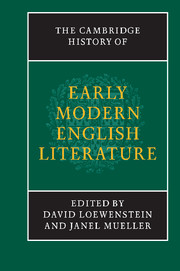Book contents
- Frontmatter
- Introduction
- 1 Modes and means of literary production, circulation and reception
- 1 Literacy, society and education
- 2 Manuscript transmission and circulation
- 3 Print, literary culture and the book trade
- 4 Literary patronage
- 5 Languages of early modern literature in Britain
- 6 Habits of reading and early modern literary culture
- 2 The Tudor era from the Reformation to Elizabeth I
- 3 The era of Elizabeth and James VI
- 4 The earlier Stuart era
- 5 The Civil War and Commonwealth era
- Chronological outline of historical events and texts in Britain, 1528–1674, with list of selected manuscripts
- Select bibliography (primary and secondary sources)
- Index
- References
1 - Literacy, society and education
from 1 - Modes and means of literary production, circulation and reception
Published online by Cambridge University Press: 28 March 2008
- Frontmatter
- Introduction
- 1 Modes and means of literary production, circulation and reception
- 1 Literacy, society and education
- 2 Manuscript transmission and circulation
- 3 Print, literary culture and the book trade
- 4 Literary patronage
- 5 Languages of early modern literature in Britain
- 6 Habits of reading and early modern literary culture
- 2 The Tudor era from the Reformation to Elizabeth I
- 3 The era of Elizabeth and James VI
- 4 The earlier Stuart era
- 5 The Civil War and Commonwealth era
- Chronological outline of historical events and texts in Britain, 1528–1674, with list of selected manuscripts
- Select bibliography (primary and secondary sources)
- Index
- References
Summary
The rudiments
In 1607, Christopher Meade, gentleman, and steward of the manor court of Little Gransden in Cambridgeshire, appeared in the Court of Exchequer to give evidence in a suit concerning the size and whereabouts of the demesne and the yardland in Gransden. The purchasers of this former episcopal manor could not, in a fashion not unknown elsewhere amongst this batch of episcopal sales, find their purchase, which had been farmed by the tenants since the fourteenth century. Christopher Meade was an antiquarian of considerable skill and resourcefulness, for he had searched the thirteenth-century episcopal surveys of Gransden, and the medieval reeves’ accounts, and then tied the documents to surviving earthworks to reconstruct the layout of the demesne. It is the first record known to us of a local historian ‘getting mud on his boots’ and doing some fieldwork. Meade, however, had a considerable advantage: he had been to school in the 1570s or 1580s in the chancel of Little Gransden church with a very mixed group of the other witnesses, who, as children, had been schoolfellows. These children had talked about the rumour that houses had once stood in the Bury Close, and played over the surviving tell-tale earth-works. So Meade’s gentry status did not prevent his learning the ‘rudiments’ along with other village children in the church chancel.
- Type
- Chapter
- Information
- The Cambridge History of Early Modern English Literature , pp. 13 - 54Publisher: Cambridge University PressPrint publication year: 2003
References
- 1
- Cited by



